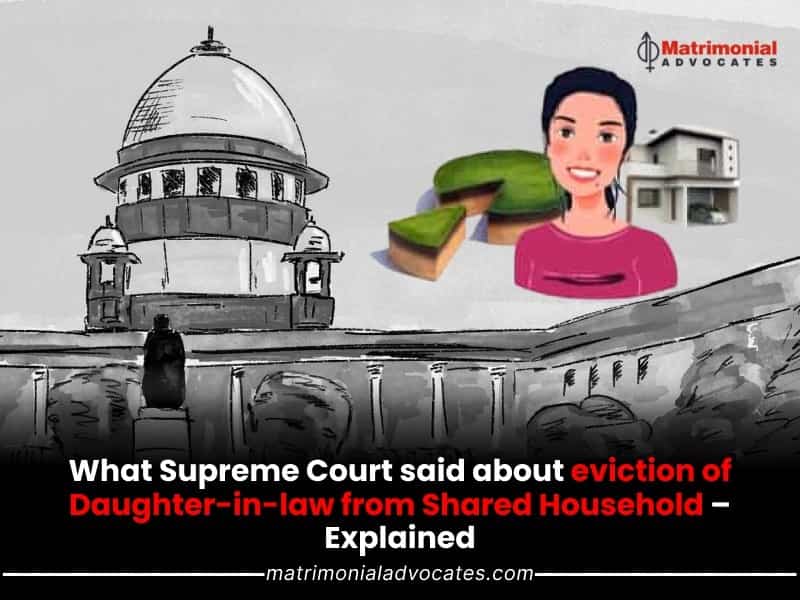
Brief Synopsis of Judgement i.e, S. Vanitha (SMT.) Vs. Deputy Commissioner & Ors. Dated 15.12.2020
This judgement reflects a clear matrimonial dispute arose between the parties. The present dispute arises out of an application filed by the Respondent No.2 and Respondent No.3 (Father-in-Law) against the Appellant who is their Daughter-in-Law. The Respondent No.2 and Respondent No.3 are parents of the Respondent No.4. Basically the dispute arose between the Respondent No.4 (Husband) and the Appellant (Wife). The Application filed under the provision of Maintenance & Welfare of Parents and Senior Citizens Act, 2007.
In this judgement the Assistant Commissioner & Deputy Commissioner in Appeal allowed the application under the Senior Citizens Act, 2007 and directed the Appellant to vacate the suit premises. Before the Division bench of Karnataka It was decided on 17th.09.2019 that the suit premises belong to the Respondent No.2 (Mother-in-Law) and the remedy of the Appellant for maintenance and shelter lies only against Respondent No.4. That the Division bench upheld the Order of Deputy Commissioner and directed the appellant to vacate the suit premises before 31st December, 2019. Thereafter Appellant moved this Court under Article 136 of the Constitution.
Factual Matrix
- The Appellant and Respondent No.4 were married on 30th May, 2002. The appellant alleges that harassed for dowry and even instigated to institute a suit for partition against her father in 2003 which Appellant later withdrew, after Respondent No.4 allegedly deserted her to be in the relationship with another woman. The subject matter of controversy is a residential house situated at Gangondonahalli, Dasanapura, Hobli, Bengaluru North Taluk. The land was purchased by Respondent No.4 on 2nd.05.2002, before the Appellant married him. The Appellant alleges that her father had financed a portion of this purchase.
- That on 5th October, 2006, the Respondent No.4 sold the land to Respondent No.3 thereby, the transaction between was for the same consideration of Rs. 1.19 lacs, as paid by Respondent No.4 for the original purchase or property in 2002. In 2009 Respondent No.4 started a Petition for Divorce under Section 13(1) (ia) and (ib) of Hindu Marriage Act, 1955 before the Senior Civil Judge and Judicial Magistrate First Class, Nelamangala. Thereafter on 17.08.2010 Respondent No.2 instituted a suit against the Appellant seeking a permanent injunction restraining the Appellant from interfering the possession of the suit property.
- That On 19.07.2010 held that the Residential house gifted to R2 by R3 so Appellant was residing in that property but she was held to have no right or authority over that property. The Appellant can claim maintenance only from Respondent No.4. The Assistant Commissioner allowed the Petition by directing Respondent No.4 to pay a monthly maintenance of Rs. 10,000 to his parents and appellant to vacate the premises. On 5th Dec, 2013 the Petition for divorce was allowed by the trial judge and the marriage between the Appellant and Respondent No.4 was dissolved.
- That in 2015, an application was filed by Respondent No.2 & 3 before Assistant Commissioner, Bengaluru North Sub- Division, under the provisions of the Maintenance and Welfare of the Parents and Senior Citizens Act, 2007 for the eviction of Appellant and her daughter from the suit property.
- That in 2015, the Respondent No.3 & 4 invoked the provisions of the Senior Citizens Act, 2007 by instituting an Application before the Assistant Commissioner, Bengaluru North Sub- Division. The reliefs sought were:
a) Eviction of the appellant from the suit premises where she was residing:
b) Court directed to Respondent No.4 to pay an amount of Rs. 15,000 to the parents by the way of monthly maintenance:
c) Court directed to the Appellant and Respondent No.4 to pay an amount quantified of Rs. 25,000/- towards legal expenses. - That on 29.02.2016 Deputy Commissioner dismissed the appeal and order to vacant the suit property was confirmed. That on 18.06.2019 Single Judge of the Karnataka High Court held that the suit premises were transferred by Respondent No.3 to Respondent No.2 by a registered gift deed thereafter Appellant had no over right on the suit property and she can claim the maintenance only from the Respondent No.4.
Apex Court allowed the Appeal by setting aside the order of eviction of Appellant. Moreover, to enable the Appellant to pursue her remedies under PWDVA Act, 2005 Respondents were restrained from disposing off the premises or from creating any right, title and interest in favor of any third party for a period of one year.
Court referring the judgement Satish Chandra Ahuja Vs. Sneha Ahuja in this expression shared household is exhaustive. Court observed that shared household in Section 2(s) of PWDVA Act, 2005 could be divided into two parts:
Part-I Meaning of shared household- A household where the person aggrieved in a domestic relationship either singly or along with the Respondent. OR At any stage has lived in a domestic relationship either singly or along with the Respondent.
Part-II Inclusive and extended part of shared household- Whether owned or tenanted either jointly by the aggrieved person and the Respondent OR Owned or tenanted by either of them in respect of which either the aggrieved person or the Respondent or both jointly or singly have any right, title or equity.
Allowing the Maintenance and Welfare of Parents and Senior Citizens Act, 2007 to have an overriding force and effect in all situations, irrespective of competing entitlements of a woman to a right in a shared household within the meaning of the PWDVA Act, 2005, would defeat the object and purpose which the Parliament sought to achieve in enacting the latter legislation. The law protecting the interest of senior citizens is intended to ensure that they are not left destitute, or at the mercy of their children or relatives. Equally the purpose of the PWDVA Act, 2005 cannot be ignored by a sleight of statutory interpretation. Both sets of legislations have to be harmoniously construed.
Hence, the right of woman to secure a residence order in respect of a shared household cannot be defeated by the simple expedient of securing an order of eviction by adopting the summary procedure under the Maintenance & Welfare of Parents and Senior Citizens Act, 2007.





